Understanding SSD Chemical for Cleaning Black Money
What is SSD Chemical?
SSD chemical is a specialized solution used primarily for the cleaning of banknotes that have been stained or soiled. This chemical compound is sought after in various industries, particularly in financial contexts, owing to its effectiveness in restoring the appearance of damaged currency. The application of SSD chemical is crucial in certain scenarios, especially when dealing with black money, which refers to money that has been illegally obtained or is unaccounted for in the financial system.
The Importance of SSD Chemical in Financial Restoration
Utilizing SSD chemical is critically important for those who work in the field of financial restoration. This process not only aids in cleaning black money but also helps in the legal and ethical management of currency. By restoring the physical integrity of damaged notes, stakeholders can ensure that the money can return to circulation and be accounted for legitimately.
How to Use SSD Chemical Safely
When using SSD chemical, it is vital to adhere to safety protocols, as the chemicals involved can be hazardous. Proper protective gear such as gloves and goggles should be worn to prevent direct contact. Additionally, it’s advisable to work in a well-ventilated area to mitigate any inhalation risks. Understanding the correct usage of S SD chemical not only protects users but also enhances the effectiveness of the cleaning process. This knowledge is essential for anyone involved in the management or restoration of black money.
Legal and Ethical Considerations
The utilization of SSD chemical in the recovery of black money raises significant legal and ethical concerns that must be thoroughly examined. Legally, the use of S SD chemical, which is designed to restore defaced or damaged currency, is regulated under specific laws pertaining to currency restoration. Engaging in illicit practices such as money laundering or the unauthorized recovery of black money can result in severe penalties, including hefty fines and imprisonment. It is essential for individuals and organizations to understand the jurisdiction-specific laws governing the use of such chemical agents in financial recovery processes. Violating these laws not only jeopardizes individual freedoms but also taints the legitimacy of recovery efforts.
Moreover, ethical considerations play a crucial role in assessing the use of S SD chemical for black money recovery. Ethical responsibility dictates that the methods employed in recovering defaced currency be used solely for legitimate purposes, ensuring compliance with regulations while upholding moral standards. Misuse of SSD chemical for money laundering or other fraudulent activities undermines the integrity of the financial system and poses broader risks to society. Stakeholders involved in currency recovery must remain vigilant in their practices, promoting transparency and accountability throughout the process.
Furthermore, the adverse implications of unethical practices can lead to public distrust and potential backlash against the legitimate currency recovery industry. Thus, it becomes vital for all entities involved, whether governmental or private, to establish robust protocols that validate and monitor the use of SSD chemical. By adhering to legal frameworks and ethical guidelines, individuals and institutions can not only facilitate the responsible recovery of black money but also reinforce public confidence in financial restitution efforts.





Reviews
There are no reviews yet.